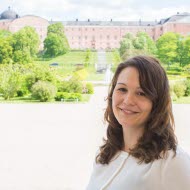EJT:s högre seminarieserie
Syftet med seminarieserien är att stärka forsknings- och utbildningsmiljön inom institutionens ämnen genom vetenskapliga diskussioner, presentation av forskning och pedagogiska idéer i en konstruktiv och kreativ miljö.
Welcome to EJT higher seminar May 27th!
During this seminar, we will listen to two presentations: The first is Solene Prince (between 13.15 and 14.30) and the second is Malin Zillinger (between 14.45-15.45).Below is some information about the two presentations.
Solene Prince
Solène Prince is a senior lecturer in tourism at EJT. She recently completed a post-doctoral fellowship at Linnaeus University in Kalmar, where she researched narratives and experiences in ancestral tourism. She obtained her PhD in tourism studies at Mid-Sweden University in 2017. At this seminar she will present her research on Ancestral tourism in Sweden – Stories of travel through past and present, discussant is professor Jonas Larsen vid Roskilde University.
Abstract: Genealogy research is a popular hobby amongst people of industrialized countries. Many amateur genealogists eventually partake in ancestral tourism and travel to places related to their ancestors’ lives in order to pursue this passion further. After waves of emigrations, there are now millions of individuals of Scandinavians origins in countries like the USA, and many wish to discover Sweden as the land of origin of their ancestors. This project is based on 40 in-depth interviews and explores the dynamics of ancestral travels to Sweden and the significance of this activity in the construction of a genealogical identity for Swedish-Americans. Importantly, ancestral tourism to Sweden is about becoming a member of a Swedish family, adding substance to a genealogical story, and establishing a sense of belonging to Swedish society. This analysis of the stories of Swedish-American ancestral tourists reveals how authenticity in this type of tourist experience rests on the narrative performance of a coherent genealogical self. Moreover, ancestral tourism experiences in Sweden are unlike other forms of tourist experiences as they rely on affective entanglements with the past and social interactions based in a familiar present at sites of personal relevance outside of the destination’s control.
Malin Zillinger
Malin Zillinger is a tourism researcher affiliated to Mid Sweden University and Lund University. She completed her phd in human geography in Umeå, being located at Miun during those years. Since then, she has worked in research projects related to information search, innovation, and experiences in time and space. She is theoretically interested in tourism as a system, and also dedicated to the dialogue between those who build academic arguments, and those who work with tourism-related questions in their organisations. The seminar consists of a presentation and a following discussion. The discussion paper will be sent out the week before the seminar.
Abstract: Information and communication technology (ICT) is ubiquitous in tourism and this changes not only tourists’ immediate behaviour, but also what tourism is. In this way, digitalisation is shifting perceptions of when tourism starts and ends, and how it can ontologically be understood. The aim of this discussion paper is to initiate a debate about the consequences of today´s fast digitalization on the concept of tourism. It does so by producing arguments on the concepts of the (extra)ordinariness of tourism, travel information search, social media, tourist behaviour, tourist experiences, and the definition of tourism. In this way, the paper is based on observations from a wide range of perspectives. It also entails a short empirical study on digitalization within the tourism and hospitality industry. In conclusion, the paper argues that we see a distinct ontological shift away from parallel perceptions of everyday and tourism. Digitalisation is one major driver of this shift, as it is blurring the lines between dichotomies such as home and destination, everyday and holiday. The paper ends with comments on the importance of this knowledge for research, industry, and the transfer of knowledge between them.
Kontakt

